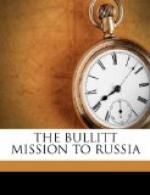Within the communist party itself there is a distinct division of opinion in regard to foreign policy, but this disagreement has not developed personal hostility or open breach in the ranks of the party. Trotski, the generals, and many theorists believe the red army should go forward everywhere until more vigorous intervention by the Entente is provoked, which they, too, count upon to bring revolution in France and England. Their attitude is not a little colored by pride in the spirited young army. (Appendix, p. 62.) Lenin, Tchitcherin, and the bulk of the communist party, on the other hand, insist that the essential problem at present is to save the proletariat of Russia, in particular, and the proletariat of Europe, in general, from starvation, and assert that it will benefit the revolution but little to conquer all Europe if the Government of the United States replies by starving all Europe. They advocate, therefore, the conciliation of the United States even at the cost of compromising with many of the principles they hold most dear. And Lenin’s prestige in Russia at present is so overwhelming that the Trotski group is forced reluctantly to follow him. (Appendix, p. 63.)
Lenin, indeed, as a practical matter, stands well to the right in the existing political life of Russia. He recognizes the undesirability, from the Socialist viewpoint, of the compromises he feels compelled to make; but he is ready to make the compromises. Among the more notable concessions he has already made are: The abandonment of his plan to nationalize the land and the adoption of the policy of dividing it among the peasants, the establishment of savings banks paying 3 per cent interest, the decision to pay all foreign debts, and the decision to give concessions if that shall prove to be necessary to obtain credit abroad. (Appendix, p. 64.)
In a word, Lenin feels compelled to retreat from his theoretical position all along the line. He is ready to meet the western Governments half way.
PEACE PROPOSALS
Lenin seized upon the opportunity presented by my trip of investigation to make a definite statement of the position of the Soviet Government. He was opposed by Trotski and the generals, but without much difficulty got the support of the majority of the executive council, and the statement of the position of the Soviet Government which was handed to me was finally adopted unanimously.
My discussion of this proposal with the leaders of the Soviet Government was so detailed that I feel sure of my ground in saying that it does not represent the minimum terms of the Soviet Government, and that I can point out in detail wherein it may be modified without making it unacceptable to the Soviet Government. For example, the clause under article 5—“and to their own nationals who have been or may be prosecuted for giving help to Soviet Russia”—is certainly not of vital importance. And the clause under article 4, in regard to admission of citizens of the soviet republics of Russia into the allied and associated countries, may certainly be changed in such a way as to reserve all necessary rights to control such immigration to the allied and associated countries, and to confine it to persons who come on legitimate and necessary business, and to exclude definitely all possibility of an influx of propagandists.




